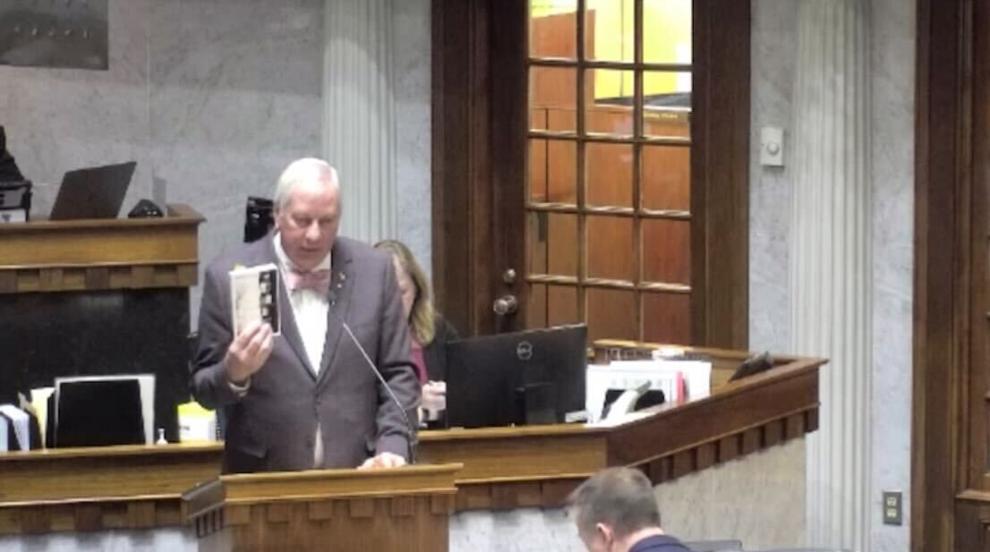“Harmful Material For Minors” Bill Passes Despite Question From Democrats: Harmful According To Whom?
INDIANAPOLIS—The Indiana Senate Tuesday passed a controversial bill regarding “harmful material for minors.â€
Sen. James Tomes, R-Wadesville, author of SB17, holds up a book while talking about the vulgar material he says it holds. His bill seeks to change the law around such “harmful material” and its accessibility to minors.

Photo by Maddie Alexander, TheStatehouseFile.com.
Sen. James Tomes, R-Wadesville, authored Senate Bill 17, which “removes schools and certain public libraries from the list of entities eligible for a specified defense to criminal prosecutions.’’
“The bill is only removing one word in our statute … education; someone who violates this law cannot claim it is educational,’’ Tomes said. “They cannot use that as a defense. There is a strict criterion that has to be met for a book to be illegal. This book has to meet every one of these four criteria … nudity, sexual conduct, sexual excitement and abuse.â€
On Monday, two Democratic attempts to amend the bill failed.
Sen. Fady Qaddoura, D-Indianapolis, discussed his amendment that would, in his words, “create safe measures for an administrative process between a complaint and prosecution so that we don’t overwhelm our prosecutors’ offices with parents who might not feel comfortable with the topic, and then we run all the way to the court system, and then the prosecutors will deem that these are not worthy of prosecuting.â€
He explained that a parent may go to a teacher and register a complaint that then goes to the principal, the superintendent, and then the Department of Education “to issue a final determination before the case moves forward to prosecution.â€
“I am just not comfortable with going from a complaint straight to a prosecution,†Qaddoura said. The amendment failed, 14-35.
An amendment from Sen. J.D. Ford, D- Indianapolis, would have delayed Senate action on the bill, instead referring it to a committee for further study.
“What can deem as harmful to one parent, may not deem harmful to another,” Ford said, adding that parents may complain about books in the library that they think are harmful, but cell phones can carry more harmful material. This amendment also failed, 10 to 39.
In Tuesday’s debate before the bill’s passage, Ford acknowledged that children shouldn’t have access to pornographic material.
However, he added, “Who is deeming what is harmful? … In committee, we heard somebody testify that any LGBTQ material is deemed harmful, so that person can walk in and file a complaint.â€
Sen. Greg Taylor, D- Indianapolis, raised concerns about the bill as an issue of race, citing as an example the use of the “N-word†in books.
Taylor talked about the book “Huckleberry Finn†and how it was offensive to him because of the use of the “N-word,†but his teacher had told his mom that it was educational. Taylor agreed with Tomes about pornographic material having no place in a library where kids could access it. However, he said, “that’s not all this bill does.â€
Sen. Michael Young, R- Indianapolis, argued in favor of the bill. He said the examples brought up had nothing to do with the bill and that the bill is talking about “sexual items.’’
“If we don’t allow kids to go into a pornographic book store,’’ Young said, “why do we want them to be able to go into a library and get the very same book they couldn’t get anywhere else?â€
SB17 passed 34-15. Similar legislation has been proposed in other states, including Tennessee, where a school board has drawn national attention for removing from schools the book “Maus’’ after determining it was harmful material to children.
FOOTNOTE: Madeline Alexander is a reporter for TheStatehouseFile.com, a news website powered by Franklin College journalism students.






Why are they so worried about one word? The word “education” describes a learning process, which means one can be be educated in building pipe bombs, torture methods, deviate sexual acts, embezzlement, etc. While these are extreme examples, and, while most people view “education” as something positive, using the word “education” merely as a justification isn’t an acceptable reason or defense for anything.
In response to Daniel Hostettler. When “education†is taken out of consideration for justifying a book remaining on the list of accepted reading in a school, does that not disregard the “value†of a student’s reaction to something offensive like the “Nâ€word? Hopefully, it is a negative reaction from the student, and isn’t that something society would desire? How is a student to learn how degrading this word is without feeling his/her reaction to the use of it?
In another example, how is a student to feel disgust over the horror of the Holocaust, unless that student learns about it, which would occur more than likely in school?
I know these two topics are emotional and there are controversies over discussing both of these in class. But, if all students learn is a whitewashed version of words and events, for example, the “N word†is removed from a book or the book not accepted and the Holocaust is removed from history discussion by denying books about it, how can we expect students to avoid using the offensive word and how can we expect students to avoid horrific events like the Holocaust in the future?
Education in school provides a platform for discussion; it provides a platform for parents, too. We shouldn’t be afraid of discussion in school , we should take advantage of the opportunity to instill our opinions and beliefs. Education in school opens another door for parents, it doesn’t close it.
In response to Gail Riecken, the two topics you write of, the “N” word and the Holocaust, aren’t germane to Senator Tomes bill.
But, you have provided a good example of “misdirection” from the topic on hand.
Comments are closed.